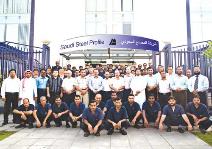“A steel factory provides material for essential construction construction projects like railways and airports as well much-needed job opportunities,” he added.
“Now the steel industry has gone into the private sector and has gotten involved in huge volumes of work but initially, Saudi Arabia set up its first steel plant back in 1980 as the Sabic Hadeed.” Zakaria said that the country’s constructors cannot rely on steel imports for big infrastructure projects because they are then vulnerable to global ups and downs.
Saudi Arabia consumes almost 16 million tons of steel, of which nine million are produced locally. “Steel is imported from far eastern countries like China, sometimes Turkey and even neighboring countries where there is excess supply of steel.
They sell it or dump it in Saudi Arabia because we still have a very big market for steel,” he explained.
“Also, we see a very big potential for growth in the country as there are almost half a trillion-dollar projects in the pipe line for the next five to six years and for which the government has already committed.
“We are also expecting huge demand from Qatar, as it plans on spending some like 100 billion dollars for the world cup, and is relying on steel supplies from Saudi Arabia.”
He added that there is a bright future for the Saudi Steel Profile company though they faced difficulties in 2008 because of the world economic crisis and the oil price crash but 2009 and 2010 have allowed the company plenty of time to recover.
Speaking about quality benchmarks, Zakaria noted that the world steel industry now has many more players and competition than before and customers are entitled to know about these benchmarks.
“Our highly experienced, motivated and dedicated team ensures on-time delivery of orders and maintaining quality standards while keeping the cost down. Our market share is almost 30 percent and we are the largest manufactures of this segment of steel products in Saudi Arabia,” he concluded.
– Saudi Gazette
